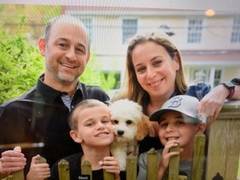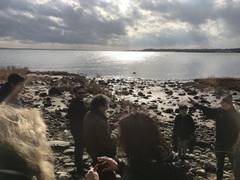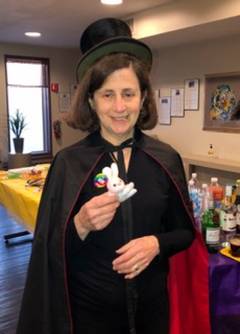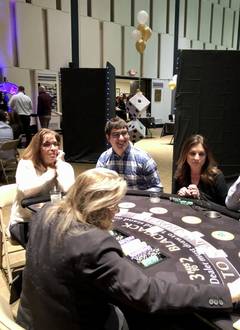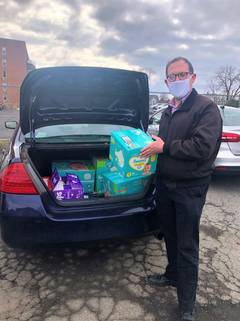Noach 5780: Believing and Not Believing
11/07/2019 03:22:51 PM
Nov7
| Author | |
| Date Added | |
| Automatically create summary | |
| Summary |
Alison Spodek Keimowitz was dying. She lay in a hospital bed, dying of leukemia as a 37 year old mother of two children. Her illness, of course, took a toll on her mental state. She was too blown apart by her illness and intensive treatment to depend on the mindfulness practice that has sustained her through the ups and downs of life prior to her illness.
But a mindfulness practitioner gave her a simple exercise: to count to four in line with her breath, as a way of holding herself through a few moments of pain and misery. Then she would count to four, again and again and again.
This alone obviously did not cure her, or even relieve much of her pain. But those four-breath increments gave her a space to sit with that misery and to explore its contours, to experience what was happening to her in doses she could handle.
The gift of that spiritual practice, alongside the dedication of her medical caregivers and devoted family, helped pull her back from the brink. None of the people who helped her could know for sure that their efforts would bear fruit.
Nonetheless, Alison writes, “they gave them freely, hopefully, and with the knowledge that they had nothing else to offer.” Facing despair, but not succumbing to it, they took action and gave of themselves. They had reason to believe that things might get worse rather than better. But that did not stop them from giving their all to try to save her life. And save it they did.
In this week's Torah reading, we encounter another person on the brink of death and destruction. The world had become so corrupt, humanity so debased, that God calls upon Noah to build an Ark in order to preserve the animals and restart humanity with his family. Noah, a righteous man relative to his generation, obeys God's command. According to rabbinic tradition, Noah spent dozens of years slowly building the Ark, hoping that his fellows would realize the end was near and would change their foul ways.
Yet, even though the Torah asserts several times that Noah did what God commanded him, our sages sense some hesitation on Noah's part. The Torah says, “Noah, with his sons, his wife, and his sons' wives, went into the ark because of the waters of the Flood” (Genesis 7:7). The word translated as “because,” mipnei, literally means, “from the face of.”
So, this verse can be understood to mean that the floodwaters chased Noah and his family into the Ark. They ran for their rescue ship one step, but not more, ahead of the great waters that overwhelmed the world. They waited until the last moment until giving up.
Indeed, one ancient rabbi (Genesis Rabbah 32:6) said that Noah did not enter the Ark until the water reached his ankles. That rabbi saw in Noah's hesitation a lack of faith that the Flood would actually occur, a lack of faith that God would fulfill God's promise to destroy the world.
Noah's doubt, though, itself came from faith, a faith in God's mercy. Noah's believed that there was no way God would actually destroy almost all of Creation. So yes, Noah dutifully built the Ark as God commanded. Even so, he still hoped that either the people would be inspired to repent or that God would have mercy. But neither occurred, which left Noah and his family fleeing the floodwaters in the nick of time.
Rashi, the great medieval commentator, summarizes this notion. He says that Noah both believed and did not believe that the Flood was coming. Perhaps this means that Noah did not want to believe his entire generation�"his friends and neighbors�"were such terrible people as to deserve to be wiped out. Instead, he held firm in his belief both in God's mercy and also in people's ability to change. He held firm in this belief as long as he possibly could, until the waters of the Flood lapping at his feet forced him into the Ark, and into a change of perspective.
Noah was powerless to change God's decree or the behavior of his generation, his efforts to do so notwithstanding. The most he could do was wait until the very last second before giving up (Avodat Yisrael, Noach 6). So, Noah believed: he dutifully built the Ark and gathered all the animals in preparation for what was to come. But he also did not believe: he held out hope that somehow the situation could be turned around, until it became clear that it would not. He did not despair, even when things seemed hopeless.
Which brings us back to Alison. Her treatments worked and she recovered from her illness, returning about a year later to her work as a professor of chemistry and environmental studies. Before her illness, she had taught about climate change, biodiversity, and extinction. But these topics felt different to her having faced her own personal extinction. The scientific evidence suggests that we may be at the beginning of a mass extinction, which has happened five times before, that threatens the very existence of human civilization as we know it.
While this situation was familiar to Alison from her research and teaching, she saw it in a new light after her own illness. The crisis our planet faces today will not have an easy solution. In fact, at best we might only delay the inevitable. When she presents the situation to her students, she sometimes watches them fall into what she calls climate nihilism. “If we can't ‘save the Earth,' ” they ask, “why bother? Should I just drive my gas-guzzler and fly everywhere and just give up?”
Despair, though, is not a helpful reaction to this existential crisis, Alison learned. Those four-breath intervals in her hospital bed had taught her not to look away from what is painful or sad, as difficult as that is. That mindfulness practice taught her the preciousness of each moment, even the difficult, painful moments.
And, her illness and recovery taught her the value of affirming life in the face of death, of affirming Creation in the face of destruction. “My stem cell transplant,” she writes, “wasn't pointless just because I will, eventually, die of something. The years I've gained, however few or many they may be, are precious beyond measure. So too with the Earth. Each generation of humans living in relative abundance, each species saved from extinction for another 50 years, and each wild place left to function and inspire in its wildness, is precious beyond measure.”
Things may look hopeless. It is tempting to give up entirely. But we do not have the luxury of despair.
In other words, like Noah, we have to simultaneously believe and not believe. Like Noah, we have to believe in, to really internalize, the reality of the destruction that might be coming our way. We have to prepare ourselves to deal with it, just as Noah built the Ark.
But we also have to not believe. We have to not believe that our doom is sealed and therefore any efforts are pointless. We have to not believe that just because we cannot save everything, it is senseless even to try to save some things. We have to not believe that the significant threats our planet faces are the only things that matter.
Instead, like Noah, we have to keep working to save our species and our planet. We have to hold on to the possibility that somehow our efforts might improve the situation, even as we prepare for the worst. We have to not give up until the very end. We have to believe and not believe.
We have gathered this morning in celebration of the upcoming marriage of Emily and Daniel. While creating a new family has always come with some risk, these risks feel more heightened today. What does it mean to make a lifetime commitment to another person when we do not know how livable our planet will be in fifty or even twenty years?
In such a world, getting married and starting a new family is an act of faith. It affirms that, regardless of what the future may bring, that the love we have for one another still matters and is worth celebrating.
Every marriage is a bet on the future, a bet that life's joys will be heightened and life's challenges mitigated with a partner by our side, like the animals entering the ark two by two. May this couple, and may we all, be blessed with loving relationships that will help us weather whatever storms and floods may come our way.
Sun, November 2 2025
11 Cheshvan 5786
Photo Gallery
Photo Albums
Sun, November 2 2025 11 Cheshvan 5786
Upcoming Events
All Events
-
Wednesday ,
NovNovember 5 , 2025Rabbi, May I? Modern Responsa
Wednesday, Nov 5th 10:00a to 11:30a
Wednesdays, 10 - 11:30 AM, KTI Library Ever since Abraham’s famous argument with God, Judaism has been full of debate. Moses and Korah, David and Nathan, Hillel and Shammai, the Vilna Gaon and the Ba’al Shem Tov, Spinoza and the Amsterdam Rabbis . . . the list goes on. No wonder that Judaism cherishes the expression machloket l’shem shamayim, “an argument for the sake of heaven.” Beyond their historical importance, what makes these disputations so compelling is that nearly all of them, regardless of their epochs, are still being argued. The parade of characters spanning three millennia of biblical, rabbinic, and modern disputation reflects the panorama of Jewish history with its monumental political, ethical, and spiritual challenges. This series will examine Jewish responses to exile from the biblical period to our modern day. Considering texts from all genres of Jewish literary creativity, we will explore how the realities and iterpretaions Join as we re-open these timeless debates that lead us to the core of 3,000 years of Jewish conversation. • Justice: Abraham vs. God (October 19) • Holiness and Authority: Moses vs. Korah (November 9) • Inclusion: The Five Daughters vs. the Twelve Tribes (November 30) • Accountability and Morality: David vs. Nathan (December 21) • Resistance: Ben Zakkai vs. the Zealots (January 18) • Law: Hillel vs. Shammai (February 15) • Spirituality: The Vilna Gaon vs. the Baal Shem Tov (March 15) • Boundaries: Spinoza vs. the Amsterdam Rabbis (April 19) • Religious Evolution: Geiger vs. Hirsch vs. Frankel (May 10) • Zionism: Herzl vs. Wise (May 31) -
Thursday ,
NovNovember 6 , 2025Coffee with the Rabbi
Thursday, Nov 6th 8:00a to 9:00a
Start your morning with some caffeine and casual or meaningful conversation! Join Rabbi Goldberg for a Coffee Chat! Stop by Rye Ridge Starbucks any of the following Thursdays, between 8-9am: June 12 and 26 July 10 and 24 August 7 and 21 September 4 and 18 October 16 and 30 November 6 and 20 December 4 and 18 -
Thursday ,
NovNovember 6 , 2025Janet Heiser Game Night 2025
Thursday, Nov 6th 7:00p to 9:00p
Bring your friends for a night of Mah Jongg, Canasta, Bridge and prizes! Thursday, November 6th at 7:00pm KTI Social Hall $30 per person ($36 per person after Nov. 3) in memory of Janet Heiser, whose tireless effort helped to strengthen Jewish connections and continuity at KTI and the greater Jewish community Co-Chairs Pam Kaplow - pdougk@aol.com Laurie Landes - lrl52@aol.com -
Friday ,
NovNovember 14 , 2025Give Thanks at Tot Shabbat 2025
Friday, Nov 14th 5:30p to 6:30p
-
Tuesday ,
NovNovember 18 , 2025Women's Rosh Chodesh Group
Tuesday, Nov 18th 12:00p to 1:30p
New Women's Rosh Chodesh Group Tuesdays, 12:00-1:30pm Gather with Cantor Sklar and KTI friends at the start of each month of the Hebrew calendar to learn about the themes and traditions of the coming month. Learn from each other, learn more about each other and better understand the women within our tradition. Enjoy music and lunch together! Please a dairy or parve lunch to enjoy at noon, followed by the discussion at 12:30pm. KTI will provide drinks and dessert. RSVP Appreciated
Privacy Settings | Privacy Policy | Member Terms
©2025 All rights reserved. Find out more about ShulCloud

